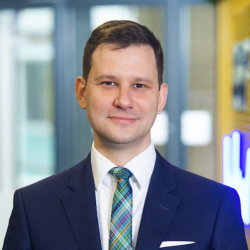Optimisation algorithms for technology computer-aided design (TCAD) of advanced semiconductor devices
An industry-supported project to investigate the use of novel ad-hoc metaheuristic algorithms to search for the optimal design of a power electronic device.
Start date
1 October 2023Duration
42 monthsApplication deadline
Funding source
The University of SurreyFunding information
The funding package for this studentship award includes:
- Full tuition fee covered
- Stipend at c £17,000 p.a.
- £3,000 Research Training Support Grant.
About
The vast majority of electrical and electronic components make use of a converter, i.e., a device that transforms DC into AC and vice versa. It is highly desirable that the converter dissipates as little energy as possible. Other requirements involve elements such as the ease of production and environmental impact of the converter. Therefore, the design of power electronic converters is a complex multi-criteria optimisation task that involves identifying hundreds of parameters and the use of computationally expensive simulators.
This project will investigate the use of novel ad-hoc metaheuristic algorithms to search for the optimal design of a power electronic device. We will, at first, study the problem as a single optimisation problem by scalarising the objective function and then as a multi-objective problem by considering one fitness landscape for each objective function. Based on the insights resulting from the analysis we will design and test ad-hoc solvers.
The student will benefit from the supervision of two experts, in machine learning and semiconductor devices, respectively. Frequent input from the industrial partner will inform the technical direction of the project, but the student will also travel to the partner’s engineering offices for specialist training and co-design sessions. The presence of an industrial end-user in the project gives the researcher exceptional awareness of the true needs of electronics designers in the industry, an insight into the operation of the design activity, hands-on training with industrially relevant datasets and an appreciation of the breadth and significance of the work’s impact.
Support networks within the School and the University’s Doctoral College present important mentoring and career development prospects. At the conclusion of the project, the student will be a leading expert in multi-objective data-driven optimisation with a deep and transferrable understanding in emerging electronic device design.
Related links
Advanced Technology Institute Nanoelectronics Centre Nature Inspired Computing and Engineering Research GroupSupervisors
Professor Ferrante Neri is a Professor of Machine Learning and Artificial Intelligence and head of the Nature Inspired Computing and Engineering research group. He is an expert of algorithmic design for optimisation algorithms with over twenty years of experience. Professor Neri was awarded Fellow of Academy of Finland on the project Algorithmic Design Issues on Memetic Computing (2009-2014). Professor Neri has published three books and over 200 peer-reviewed articles, and is a highly influential computer scientist who was included in the list of the top 2% scientists (Stanford World Ranking of Scientists).
Dr Radu Sporea holds an EPSRC Early Career Fellowship in flexible and energy-efficient sensors and conditioning electronic circuits. His research portfolio spans advanced bioinspired microelectronics (EP/V002759/1 – Silvaco are project partner), bridging the digital and physical domains using custom imperceptible electronics (EP/P02579X/1), and technology for health and wellbeing using custom electronic systems (ES/V00980X/1, EP/W031825/1). Dr Sporea holds two patents on highly versatile electronic devices and ultralow power body temperature sensors, both developed initially using Silvaco software. A large proportion of activities is concerned with the modelling and simulation of advanced electronic devices and circuits. Dr Sporea is module coordinator for EEE3026 Power Electronics, which could provide a conduit to recruitment as well as further student involvement.
Eligibility criteria
This studentship is for UK and international applicants.
Applicants are expected to hold a first or upper-second class degree in a relevant discipline (or equivalent overseas qualification), or a lower second plus a good masters degree (distinction normally required).
English language requirements
If English is not your first language, you will be required to have an IELTS Academic of 6.5 or above (or equivalent), with no sub-test score below 6.
How to apply
Applications should be submitted via the Computer Science PhD programme page on the "Apply" tab. Please clearly state the studentship title and supervisor on your application.
Computer Science PhD
Studentship FAQs
Read our studentship FAQs to find out more about applying and funding.
Application deadline
Contact details

Studentships at Surrey
We have a wide range of studentship opportunities available.

